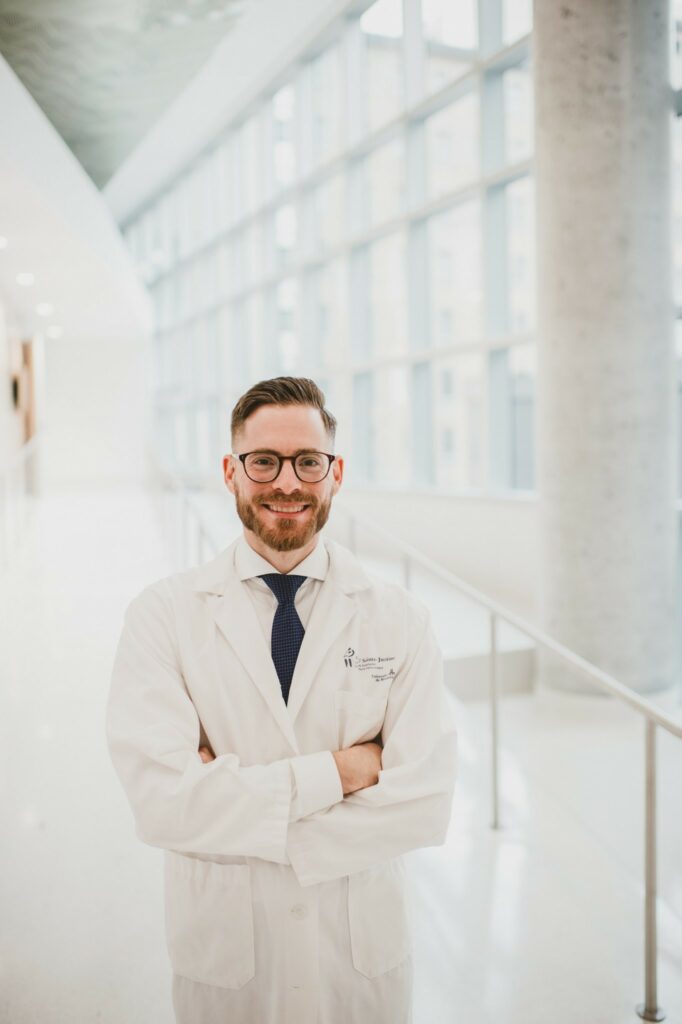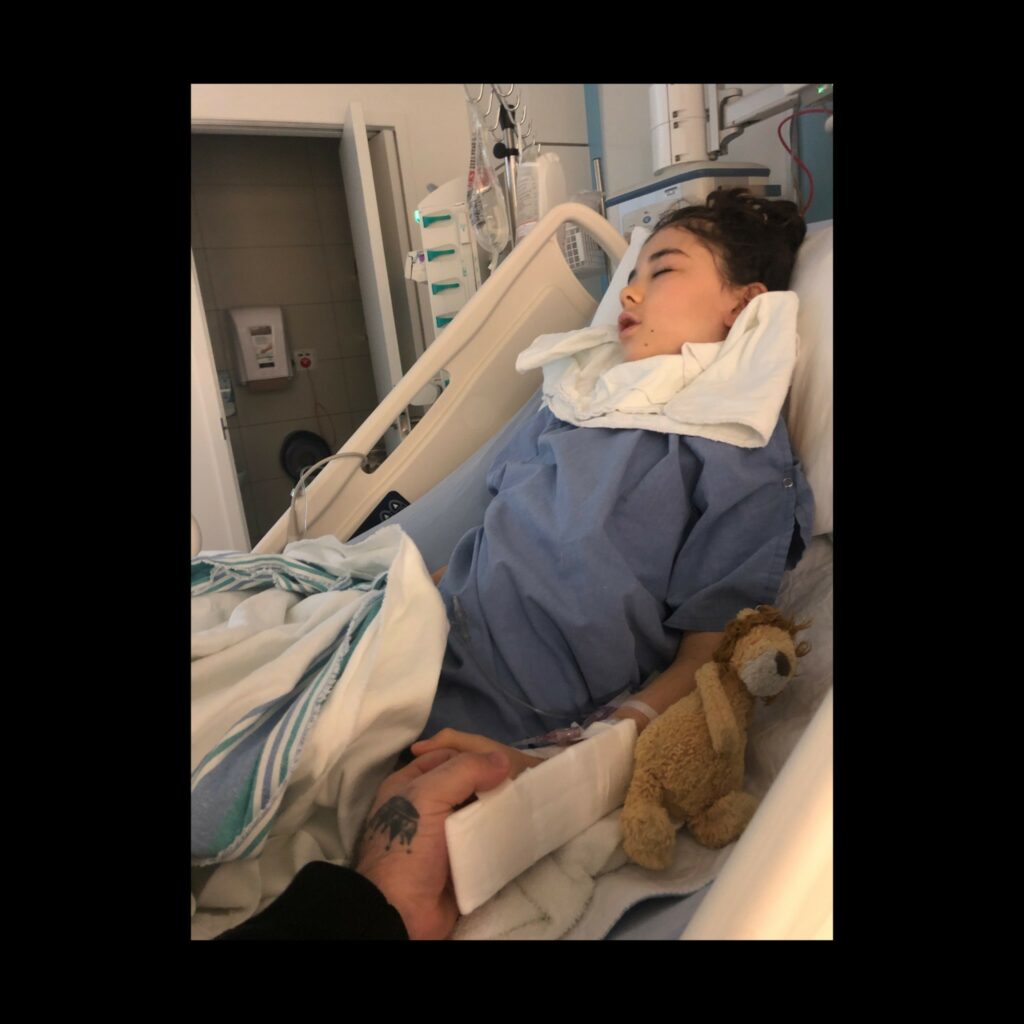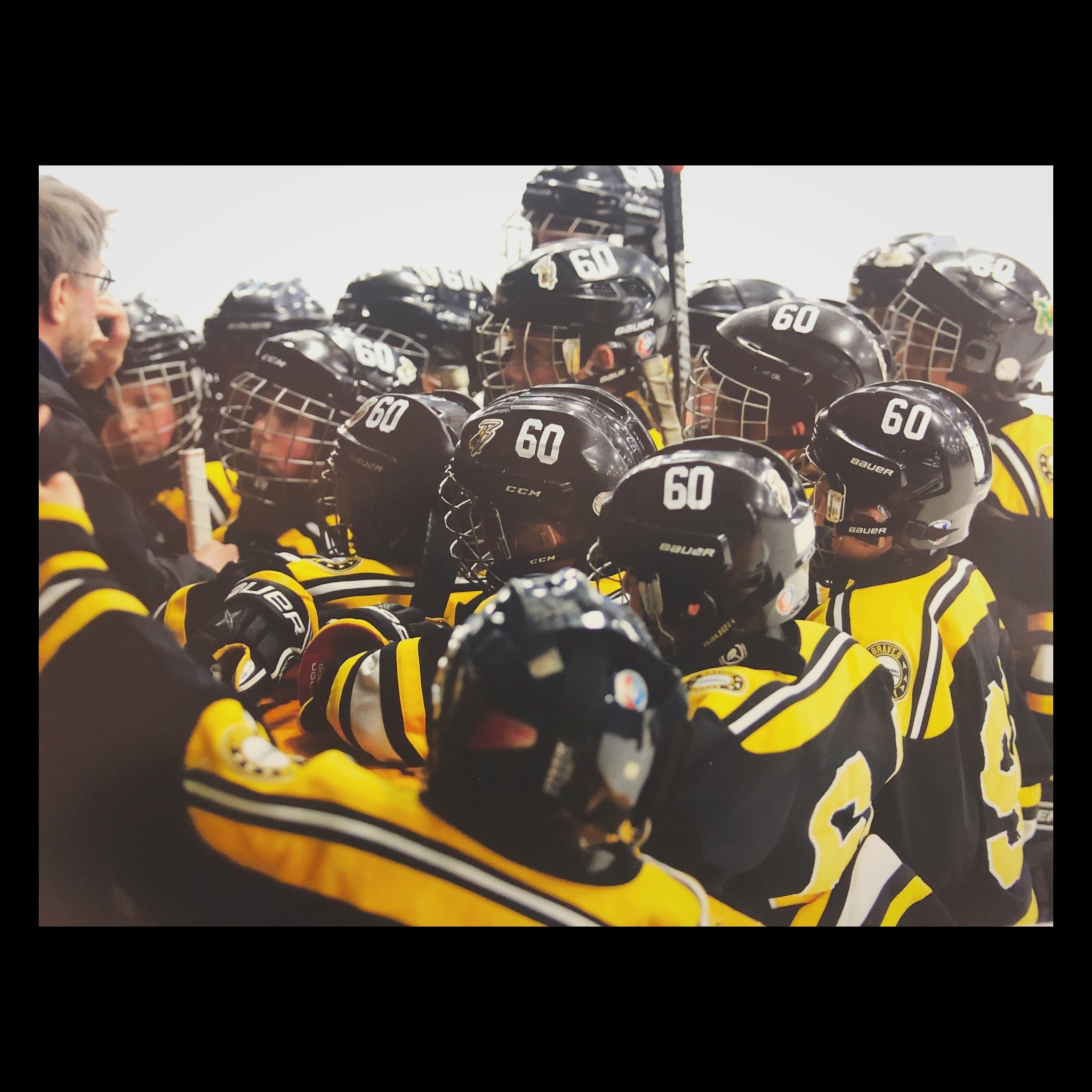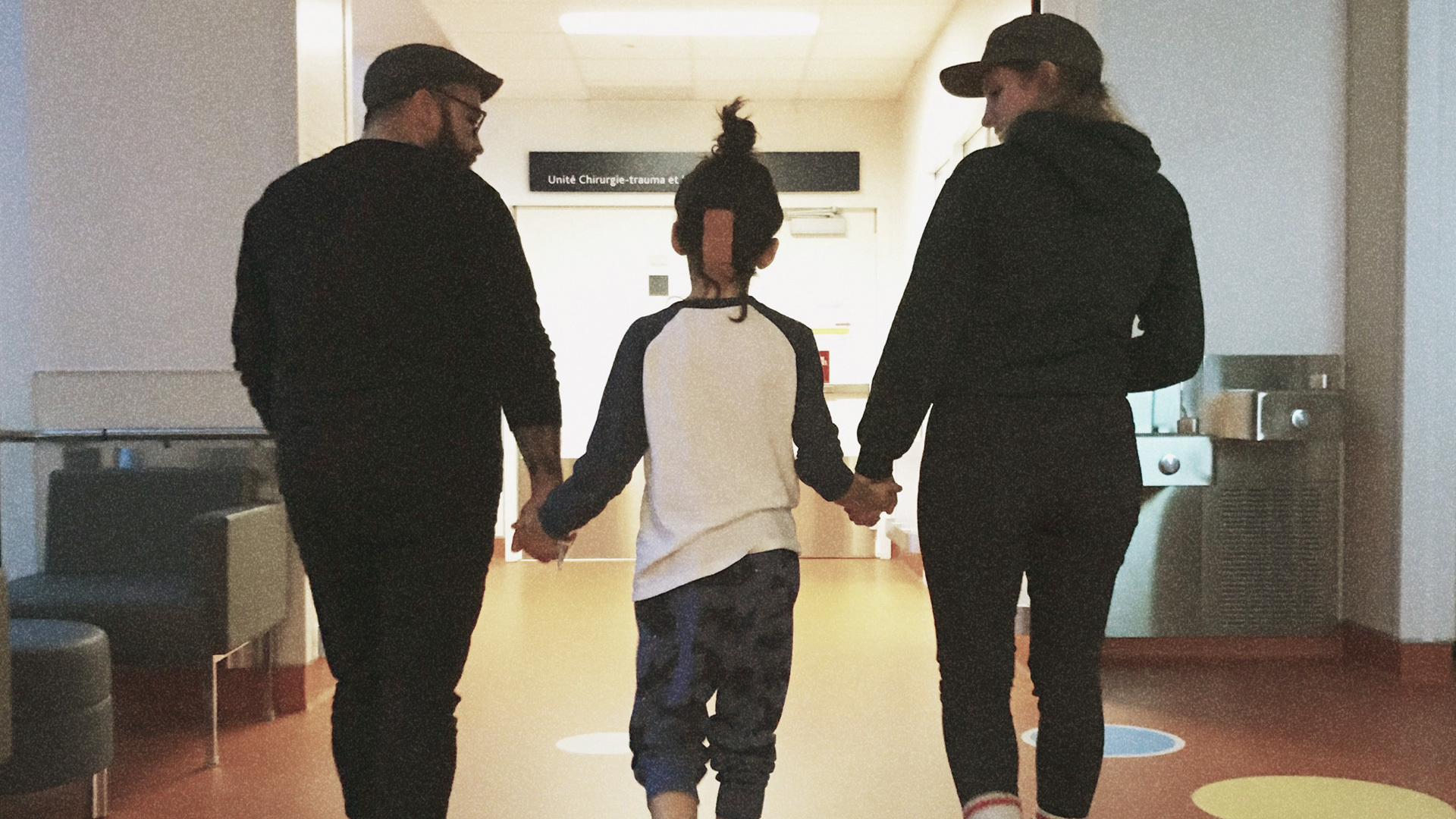November 22, 2019. I was at Atwater Market between two Christmas trees, making “funny” faces for a photographer from the Journal de Montréal. I had just announced I’d be doing my first-ever comedy show. The gloominess of November was no match for the utter glee of a guy who’s dream has finally come true. That’s when I got a text from my ex, who’s not only Xavier’s mom but also a nurse.
“He just threw up violently at school… I’m starting to get a bad feeling about this, Jo. I’m taking him to Sainte-Justine. Come meet us there when you can.
I had been suspecting a concussion for the past two weeks, after Xavier took a few hits to the head playing hockey. Let’s just say that Xavier is no wallflower when he’s out there on the ice.
He’s constantly zipping around, blocking shots left and right. But he has a heart as big as a Zamboni. He’s a fighter whose become known as the “Gallagher” of our Atom BB division. He’s always taking one for the team.
So there we were, the three of us, in a small room at Sainte-Justine, waiting for the results of the scan. I was taking a video of Xavier belting out Lisa Leblanc and showing the machines he was hooked up to. He was smiling, joking around and full of life. The “electrical jolt” running through his brain and the vomiting had stopped. He asked if we could go to the arena that night to cheer on his team, even if he wasn’t in the lineup.
Then a doctor came in with a nurse. Both of their brows were furrowed. The doctor looked at Xavier and said, “Hey there, sport. I’m going to talk to your parents in the other room for a sec. We’ll be right back.”
I glanced over at my ex and spotted the look of a worried mom and a nurse who knew something was up.
It’s in the “other room” that the whole nightmare began in earnest.
The doctor told us things that no parent ever wants to hear. Ever.
“I’m very sorry, but the news isn’t great. It’s not a concussion. The scan showed a large mass between Xavier’s brain stem and his cerebellum. He’s not going home. We have to operate on him right now. Otherwise… well… let’s not mince words, all right? The tumour is huge. It doesn’t look good. If we don’t perform surgery right away… I’m afraid it’s only a matter of days…”
I don’t remember what he said after that. He was trying to reassure us. He was being very nice all about the whole thing. But my mind had drifted off somewhere else…
That was November 22, 2019. Any wide-eyed innocence I had left in me disappeared in a flash. I knew my life would never be the same. I knew that carefree feeling we all enjoy without realizing it was gone forever. My son, one of the two people I love the most in the world, was in danger. And there was NOTHING I could do to protect him. The boy with the biggest heart in the world was the victim of a terrible injustice. It was a total and utter train wreck, and I never saw it coming. One day, everything was fine… and the next, karma spit venom in my face and left me to die.
His mother and I clutched on to each other while everything around us came tumbling down. The pain was intolerable. No matter how hard I try, I’ll never find the right words to describe the agony we felt that day.
But when something like that happens, the next thing you want to hear is precisely what we did:

“We already have a team ready to go. They’re looking at Xavier’s brain scans right now. Dr. Weil is an excellent neurosurgeon. He’s studying the images as we speak. He’ll be here in 20 minutes, tops, and go over the plan with you.”
We met Dr. Weil soon afterward. What an amazing man! He managed to calm some of our fears.
He started by acknowledging that the word “tumour” was a scary one. But removing these types of masses was something he and his team did every day. He also told us the tumour was in a really good spot in terms of taking it out. He couldn’t tell if it was malignant or not at that point, but we’d cross that bridge when we got to it. He reassured us it was normal to be frightened, but there was a whole team behind us: research, OR staff, doctors, nurses, radiologists and so many more. It felt like an army of people were marching off to war with us.
I thought the worst thing in the world was hearing that our child had a brain tumour. But it wasn’t. It was breaking the news to him. Trust me. We stood around his bed. He looked at his mother and said, “OK, what’s going on inside my head?”
I took him by the hand and I very clumsily answered:
“Here’s the thing: the good news is, it’s not a concussion. But the bad news is, you have… a kind of… ball-shaped thing… a tumour… that they have to take out…”
I froze. It was pure anguish. How could I deliver such awful news to a 10-year-old boy?
Dr. Weil looked at me and stepped in.
“What your father is trying to say, Xavier, is that you have a tumour in your brain that’s about the size of small avocado. My job is removing tumours like this one. We’ll have it out within the next three days. Promise!”
His mother picked up where Dr. Weil left off and comforted Xavier.
Ever since he was tiny, Xavier has always looked for a logical answer to his questions.
I’d ask him:
“What’s 1+1?”
He’d roll his eyes and say, “2!”
“So if you’re cold when you’re outside, don’t whine about it. Put on a coat. That just makes sense, kiddo!”
Seeing my eyes well up with tears, Xavier said:
“What’s 1+1, Papa?
I smiled and answered: “2.”
“So I have a tumour in my brain. If I want to live, it has to come out. That just makes sense.”
I hugged him tight. Dr. Weil promised he’d play hockey again someday. Xavier held on to that promise with all his heart.

The morning you say goodbye to your child while he’s being wheeled into the operating room, not knowing what state he’ll be in when he gets back… that’s the morning you’re happy to know that researchers are working like crazy to find solutions that save children’s lives. Thanks to them, my son had a decent chance of making a full recovery.
The day you thought you couldn’t possibly get any lower, only to be told the tumour is in fact malignant… that’s when you put all your faith into those teams of researchers who give medical experts like Dr. Perreault, Dr. Charpentier and everyone else the tools they need to help children get better.
You know that feeling of waking up from a nightmare in full panic mode? The one where it takes you a couple of seconds to relax and say, “Phew! It was only a bad dream!”?
For parents of sick children, it’s the other way around. You wake up in the morning and think, “Ah, it was all a… oh, no… it’s actually true. My child has cancer.”
Your nightmare… is our reality.
You hurt.
All the time.
You wake up at 2:00 in the morning. You take long walks, talking to someone, anyone out there, and begging them to let your child live.
You stop sleeping and you spend your days at the hospital, hoping that the treatments will be successful. You can’t get any work done. Your entire life gets put on hold. And even if you’ve always had a bit of money on the side, you start to the feel the financial crunch. You try to make a little headway somewhere, but every second you’re terrified you’re going to lose your child.
You live in a very dark place. The only light is the one shed by research.
Your only hope is that scientists will find the miracle that will save your child – and so many others.
I’ve seen parents say goodbye to their children. I’ve seen children who bounce back. I’ve seen specialists give their all to keep children alive. The word “children” doesn’t belong in any of those sentences.

Eight years later, and we are still waiting for nature and research to confirm my son is out of the woods. Fortunately, there’s no trace of cancer left in his body, but he’s not exactly “cured” either. There’s a whole protocol for that. Mind you, he did have a pretty big victory when he went back to play hockey. He scored a few goals his first game. He blocked the other team’s shots like a pro…
Today, I’d like to pay tribute to that little insurance policy we all know as Sainte-Justine and its Research Centre. I want parents who end up in a situation like ours to know that research is a powerful source of hope – something that can ease their pain and even bring their child back from the brink.
My thanks go out to Dr. Weil, Dr. Perreault, Dr. Charpentier, Bénédicte and everybody at Sainte-Justine and the Research Centre. And I am extremely grateful to all those who give their heart and soul to the cause of children’s health.
Children may represent a mere 20% of the population, but they’re 100% of our future.
Jo Roberge
*The remarks expressed in this article reflect the opinion solely of the author and should not be considered as representative of the CHU Sainte-Justine Foundation.










